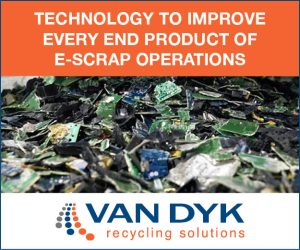Researchers in Ireland found that the country’s e-scrap and electrical appliances recycling rate for the past three years has been roughly 40%, despite a target of 65%. | Rawpixel.com/Shutterstock
A survey commissioned by a producer responsibility organization found that data security concerns are holding back recycling rates for scrap electronics and small appliances.
The survey, commissioned by WEEE Ireland, found that 21% of adults aren’t recycling their unused devices due to concerns about their personal data. Another 22% said they keep them as back-ups.
WEEE Ireland, which is the largest nonprofit electronics stewardship program operator in the country, also reported that Ireland’s e-scrap and electrical appliances recycling rate over the past three years has been around 40%. The national target is 65%.
For comparison, the U.S. e-scrap recycling rate in 2018, the most recent year for which EPA has data, was 38.5%. It’s important to note that the calculations aren’t using the same list of device types, however, with WEEE Ireland also counting appliances. Additionally, half of U.S. states have electronics EPR programs, while Ireland, as an EU member state, has a nationwide program.
WEEE Ireland emphasized the need to boost the rate to produce critical metals needed by Ireland and the rest of the EU in the renewable energy, transportation, health and technology sectors.
“We urge the public to take advantage of the available free recycling facilities nationwide and contribute to the country’s sustainable growth while helping to protect our planet,” Leo Donovan, the CEO of WEEE Ireland, stated in a press release.
Donovan also noted that EU battery regulations coming into force will include a significant increase in battery collection targets in the future. WEEE Ireland, which also handles battery collection and recycling, reported Ireland’s current national recycling rate for batteries is 45%.
More stories about research
- Project brings rare earth recovery into e-scrap facility
- Texas A&M researches rare earth extraction
- Report: Battery ‘retirement tide’ nears



